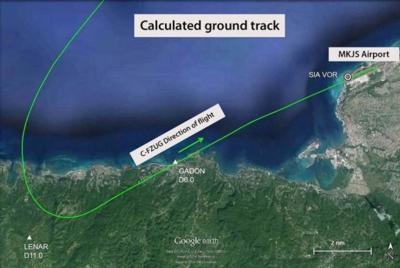Wed, Jan 11, 2017
Unstable Approach Led To The Incident Involving An Air Canada Rouge Flight
The has Transportation Safety Board of Canada (TSB) determined that an unstable approach led to the 10 May 2014 hard landing of an Air Canada Rouge Airbus A319 at the Sangster International Airport in Montego Bay, Jamaica.

There were no injuries and no structural damage to the aircraft.
The TSB said in its report that the Air Canada Rouge Airbus A319 was operating as flight AC1804 from Toronto, Ontario, to Montego Bay, Jamaica, with 131 passengers and 6 crew members on board. At approximately 14 minutes before touchdown, the aircraft was cleared for a non-precision approach to Runway 07 at the Montego Bay airport. The approach became unstable and the aircraft touched down hard. The landing subjected the main landing gear to very high loading. The aircraft was subsequently inspected and the main landing gear shock absorbers were replaced as a precaution.
The investigation determined that the approach became unstable as a result of inconsistent airspeed management and delayed configuration of the aircraft for landing. The flight crew did not adhere to standard operating procedures, which required the monitoring of all available parameters during approach and landing. The investigation also found that simulator training to recognize an unstable approach leading to a missed approach had not been provided. As such, the flight crew did not recognize the instability of the approach and continued it well beyond the point at which a missed approach and go-around should have been initiated.
If flight crews do not follow standard procedures and best practices that facilitate the monitoring of stabilized approach criteria and excessive parameter deviations, there is a risk that undesired aircraft states will be mismanaged. Unstable approaches are one of the key safety issues on the 2016 TSB Watchlist. There is also an outstanding Board recommendation (A14-01) calling for Transport Canada to require airlines to monitor and reduce unstable approaches that continue to a landing.
Following the occurrence, Air Canada Rouge refined its stable-approach policy, modified its training to include more manual flying scenarios and incorporated simulator training for unstable approaches leading to a missed approach.
(Source: TSB. Image included in TSB report)
More News
Airport Marking Aids Markings used on runway and taxiway surfaces to identify a specific runway, a runway threshold, a centerline, a hold line, etc. A runway should be marked in ac>[...]
"It is extremely difficult, if not impossible, for manned aircraft to see a drone while conducting crop-enhancing and other aerial applications at low altitudes and high speeds. We>[...]
Aero Linx: The Skyhawk Association The Skyhawk Association is a non-profit organization founded by former Skyhawk Pilots which is open to anyone with an affinity for the A-4 Skyhaw>[...]
“The T-54A benefits from an active Beechcraft King Air assembly line in Wichita, Kansas, where all required METS avionics and interior modifications are installed on the line>[...]
Aero Linx: Aerostar Owners Association The Association offers the Aerostar Owner a unique opportunity to tap an invaluable source of information concerning the care and feeding of >[...]
 ANN's Daily Aero-Term (04.28.24): Airport Marking Aids
ANN's Daily Aero-Term (04.28.24): Airport Marking Aids Aero-News: Quote of the Day (04.28.24)
Aero-News: Quote of the Day (04.28.24) ANN's Daily Aero-Linx (04.28.24)
ANN's Daily Aero-Linx (04.28.24) Aero-News: Quote of the Day (04.29.24)
Aero-News: Quote of the Day (04.29.24) ANN's Daily Aero-Linx (04.29.24)
ANN's Daily Aero-Linx (04.29.24)



